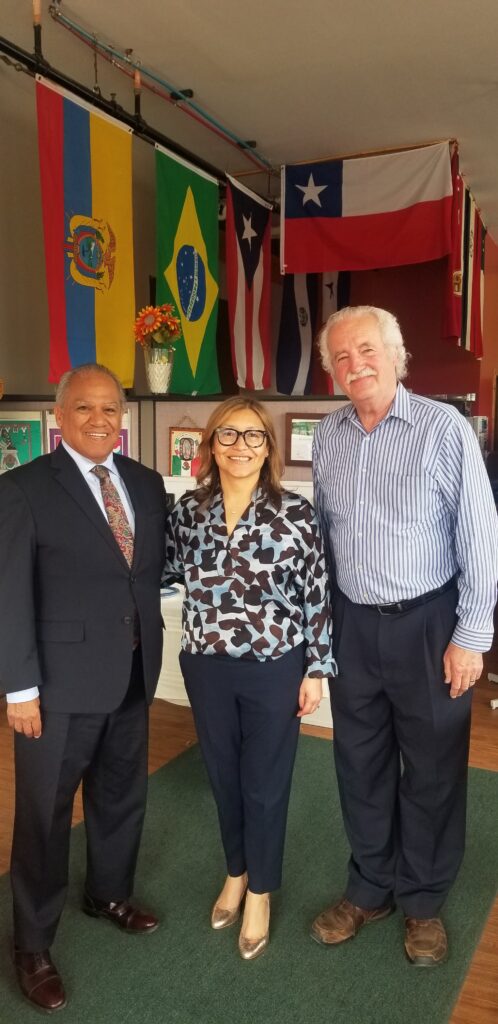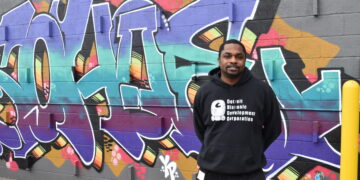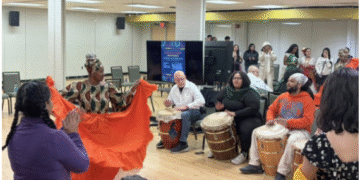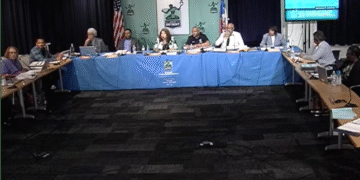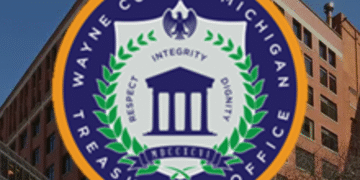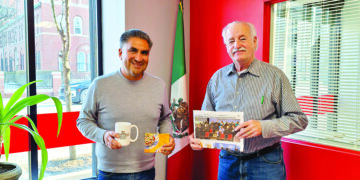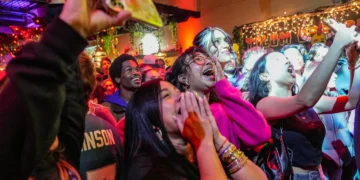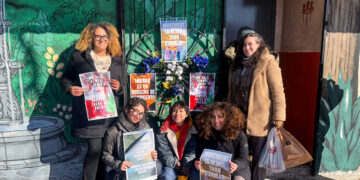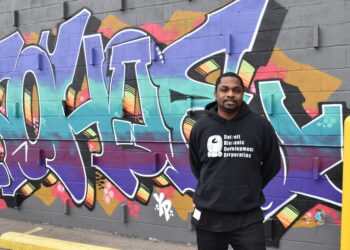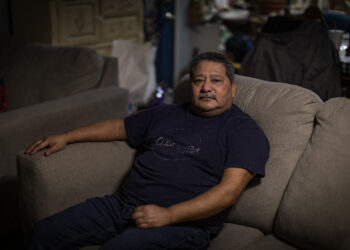EL CENTRAL Hispanic News received a unique invitation and accepted the privilege of sitting down with Julie Chavez Rodriguez, the National Campaign Manager for the Biden-Harris campaign on a recent visit she made to Detroit in May. Prior to her current role with the campaign, Ms. Chavez Rodriguez served as Senior Advisor and Assistant to the President and Director of the White House Office of Intergovernmental Affairs. She also worked in leadership positions with then Senator Kamala Harris’ campaign for president and in the Obama-Biden Administration as Special Assistant to the President and Senior Deputy Director of the Office of Public Engagement. She is the former Director of Programs at the Cesar E. Chavez Foundation and a native of California.
The interview was conducted in the offices of EL CENTRAL Hispanic News by Rogelio Landin, EL CENTRAL’s senior contributing political writer. Landin is most renowned nationally for his work with the League of United Latin American Citizens (LULAC), the largest and oldest Hispanic and Latin-American civil rights organization in the United States. Landin led the organization’s successful precedent setting filing of an Amicus in the Bradley v. Milliken II (1976-1978) desegregation case. Winning a favorable ruling in this case served to protect and preserve Bilingual education and the designation of minority status as included in the Civil Rights Act of 1964. This case has had generational national and historical implications for the education of our children and continues to provide for the protection of Hispanic civil rights.
EL CENTRAL Managing Editor Robert Dewaelsche facilitated the interview with Ms. Chavez Rodgriguez’s office. Highlights of Rogelio Landin’s interview with Ms. Chavez Rodriguez follow.
EL CENTRAL: As the national Biden Harris campaign manager, how will you ensure the campaign actively engages with the Hispanic community? Including taking, I’ll say, accepting receiving input from our community?
Chavez Rodriguez: Well, it’s a great question. And I think, one, thank you so much for inviting me here. And, getting a chance to kind of quickly see the space and just the history that you all created, as well, and the community. But for me, one, I think just my own personal experience and upbringing as the head of the campaign, I know that we have to have a team, at every turn that reflects the voters we need to reach. And Latino voters are core to our pathway to victory, as we see it, this November, and so we have built out a really strong and I think diverse team at headquarters. Now as we’re building out in our states to make sure that we have, I think campaign staff with real, not just lived experience, but real relationship with the community. We see our part, as, definitely reaching voters and making sure we’re educating them about what this administration has done for the Latino community and across the board for Michiganders. But we also know that we need to create community, we need to have a presence in areas where, like here, Southwest Detroit, where we know, there are critical, segments of our voters that we need to reach. And so, it’s why I’m here today, why I’m grateful that we have the opportunity to be able to speak to voters that you all have a trusted relationship with, because that matters. And it matters all the time, but especially this election cycle when there’s so many myths and disinformation. We need to make sure that we are reaching voters through trusted sources, through trusted networks through to the pillars of our community, like EL CENTRAL.
EL CENTRAL: Wonderful. Thank you. What is being done to address stereotypes, which is a significant part of the misinformation used as relates to the Hispanic community? In particular, bilingual education, immigration and the impossible notion that these undocumented people are “TAKING” jobs away from American citizens?
Chavez Rodriguez: I think first and foremost, fortunately, we have a president who sees the community and who understands the importance of the community. Just yesterday, I was actually at the White House, where he was giving remarks and whether he’s doing an interview, or speaking to Latino leaders, he always talks about the fact that 28% of K through 12 students are Latino. How can we not invest in, ensuring that they have opportunity and a future ahead of them? How can we turn sort of a blind eye to that? And so, he is constantly, I think, using his bully pulpit to make sure that he’s educating folks about the growth of the Latino community, the importance, the significance across the country, and the contributions that they continue to make. I would also say on immigration, he continues to focus on putting forward solutions, finding ways to use his executive authority to create pathways. For example, you mentioned the mother [who traveled from Venezuela] that you all profiled recently ensuring that we have a humane, orderly system, and that we were able to rebuild that quickly, especially after the last administration. And Trump himself continues to demonize the immigrant community, and rollback so many of the important policies that we put in place.
In fact, we just released a new ad that we’ll make sure you all get if you haven’t seen it, reminding voters of how cruel and inhumane Trump’s family separation policy was, Today is the anniversary of when it went into effect, and we remember those images of literally babies being ripped from their mother’s arms. And it’s just to think about how, I mean, callous doesn’t even begin to explain it. Just how inhumane and dehumanizing so much of his [Trump’s] rhetoric and policies were towards the Latino community. So, all of that, we’re continuing to combat and address by making sure we’re educating folks about who the community is, profiling testimonials of individuals who have benefited from what President Biden and Vice President Harris have delivered. One example is Bill Weise. He’s a carpenter in Phoenix, Arizona, who talks about the manufacturing boom, and how, the president’s bringing manufacturing back to the United States has really helped him and his family. I know, for Michigan, it’s 24,000 new manufacturing jobs, since President Biden has come into office, 400,000 jobs overall for the state. Those are extremely significant to people’s livelihoods. It’s their families. It’s how sometimes how people also identify right with, with their, kind of connection to labor, to unions to so many things.
EL CENTRAL: So, you mentioned solutions, especially as it relates to education. We have several that we would like to submit. How do we do that?
Chavez Rodriguez: Well, we can connect you with the right people, either from the Department of Education or in the administration to bring forward those recommendations.
EL CENTRAL: Yeah, okay. I think we shall see. All right. One last point I’d neglected to mention was ensuring true diversity, equity and inclusion. And I believe you touched on that in what you just shared with us. We’re back to education and economic opportunity in terms of being primary issues for our young people here in Michigan. As we look to development, it’s actually a national initiative. We are the youngest population in the country. We need to invest in that 28%. We’re so we’re kind of covering a little bit of that. And you address I guess, within that context, what the President in the campaign are doing to ensure that our youth have a successful economic future, and I think you touched on that as well. [Can you say more about that?]
Chavez Rodriguez: Things I did want to mention, on the record before we wrap up. Just on education, in particular, the Biden Harris administration has invested $11 billion in Hispanic Serving Institutions (HSIs), as we look at ensuring they have the opportunity, the ability to prepare students for jobs of today and the future. So that was a significant investment, as we think about education. And then on economic opportunity, we have seen the fastest growth of Latino small businesses under this administration, as well. And those investments have been really significant first coming out of the pandemic to make sure that so many of our — whether it was through the restaurant revitalization fund, or the PPP loans — that so many of our Mom and Pops had access to those important resources and continued to be able to tap into new funding that we’re making available. So those are just the other points that I wanted to make sure we captured.
EL CENTRAL: Thank you, Ms. Chavez, for spending your time with EL CENTRAL and our readers!
